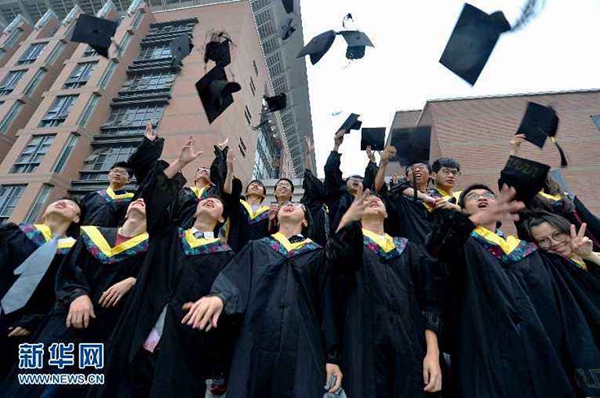Changes in Chinese higher education to benefit the country's workforce
- By Richard de Grijs
 0 Comment(s)
0 Comment(s) Print
Print E-mail China.org.cn, October 27, 2017
E-mail China.org.cn, October 27, 2017
 |
A policy encouraging universities to transition from being research-focused to becoming vocational training colleges could help plug the country's current skills gap. [Photo/Xinhua] |
One policy that President Xi Jinping addressed in his opening speech to the 19th CPC National Congress which many overlooked was a commitment to increased spending on vocational training.
This should be seen in the broader context of China’s next big economic lever, where tackling the existing inequality between the urban and rural areas and provision of better public services should provide the population with more financial leeway.
President Xi's commitment was not altogether new. He made a similar promise to support manufacturing and alleviate poverty by increasing vocational training opportunities during a visit to Qingzhen Vocational Education City (in Guizhou Province) in June 2015.
At the 2014 China Development Forum, Education Vice Minister Lu Xin had already announced a policy decision to turn 600 general universities into vocational colleges -- requiring far-reaching changes in terms of system, and departmental and faculty levels.
"There is an urgent need to reform our current education system, which has been struggling to provide high quality talents with skills and knowledge that meet the demands of the production frontline," she said.
With China's economic growth slowing down in recent years, and given the government's desire to drive the economy further up the global value chain, it has become increasingly important to plug a skills gap in the national workforce.
To upgrade the economy and keep it growing at a healthy rate, a large number of technicians and skilled workers are urgently needed in many trades and professions.
The increasing preference of Chinese students and their families for humanities and business management courses has led to an overproduction of "soft" higher degrees that cannot be totally absorbed by the current job market. Conversion of research universities into polytechnics could then help reduce the unemployment rate among university graduates.
This new vocational education policy represents a move towards a two-tier higher education system of purely academic and high-quality applied institutions, similar to that in developed European countries such as Germany and the Netherlands.
Given the wealth of experience available from their international partners, Chinese universities are keen to avoid having to reinvent the wheel; thus, they are collectively exploring the lessons learned overseas. They are particularly keen on learning from their well-established Dutch counterparts.
The strong Dutch tradition in vocational training in higher education has led to clearly defined best practices. The most valuable contribution of Dutch universities of applied sciences to their local communities and the nation is their delivery of employable graduates to industry.
Indeed, one of the core pillars established by Dutch vocational higher education institutions is a curriculum tailored to industrial needs, developed in close collaboration with professionals. All Dutch universities of applied sciences employ faculty members whose educational approach is grounded in industry practice.
Students engage in practice-based research to solve real-life problems, in tandem with their teachers, and frequently during extended periods of work placements or internships.
Chinese universities of applied sciences are also keen to exploit partnerships with employers for the benefit of regional economic development.
The country’s higher education system has been preparing for the new dual characteristics of its universities for some time. Since 2014, high school pupils have been able to take a vocational-technical gaokao -- the national higher-education entrance exam -- rather than the standard purely academic exam.
The offer of a high-quality non-academic gaokao will make sure that students with stronger vocational or technical than academic talents are not considered second-rate compared with their more academically inclined peers.
"We want students who are interested in our courses and talented in the field, not those who simply score low in the national exam," said Lao Hansheng, president of Guangdong Engineering Polytechnic, quoted by official media.
However, the scale of the reform remains a daunting challenge. In 2013, for example, less than one-fifth of all high school graduates in Shanghai opted for vocational higher-degree programs.
In addition, data provided by the National Bureau of Statistics suggests that less than a third of China's enormous population of migrant workers receive any on-the-job training. Tackling this lack of opportunities is imperative if the country is to upgrade its economy.
Changing something as large as China's higher education system will always be extremely challenging, but at least the seeds have been planted, and the State is willing.
Richard de Grijs is a columnist with China.org.cn. For more information please visit:
http://www.ccgp-fushun.com/opinion/RicharddeGrijs.htm
Opinion articles reflect the views of their authors, not necessarily those of China.org.cn.





